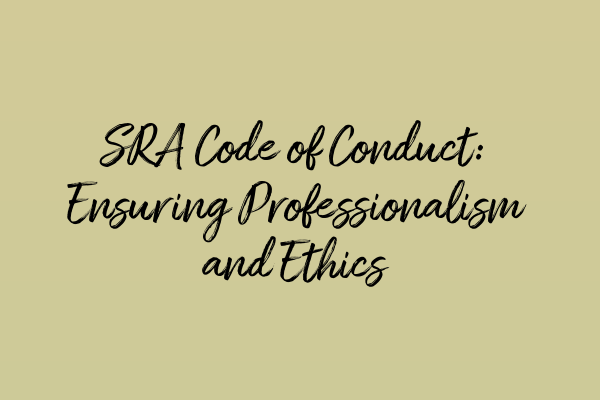SRA Code of Conduct: Ensuring Professionalism and Ethics
As a solicitor, maintaining professionalism and adhering to ethical standards is crucial to both the reputation of the legal profession and the trust that clients place in us. The Solicitors Regulation Authority (SRA) has developed the SRA Code of Conduct, which serves as a guide for solicitors to ensure they maintain the highest standards of professionalism and ethical conduct.
Compliance with the SRA Code of Conduct is not just a legal requirement but also an ethical obligation. It helps to protect the interests of clients, promote the rule of law, and maintain the integrity of the legal profession. In this article, we will take a closer look at the SRA Code of Conduct and its significance in upholding professional standards.
The Importance of the SRA Code of Conduct
The SRA Code of Conduct lays down clear principles and outcomes that solicitors must abide by in their professional practice. These principles encompass a wide range of ethical obligations, including honesty and integrity, independence, confidentiality, and maintaining public trust in the legal profession.
By adhering to the SRA Code of Conduct, solicitors demonstrate their commitment to professionalism, fairness, and ethical conduct. This not only benefits their clients but also helps to maintain the reputation of the legal profession as a whole.
Key Principles of the SRA Code of Conduct
The SRA Code of Conduct is organized into ten mandatory principles that solicitors must follow at all times. These principles provide a framework for ethical decision-making and behavior. Let’s briefly explore each principle:
- Integrity: Solicitors must act with honesty and maintain the trust of clients and the public.
- Independence: Solicitors must act independently and in the best interests of their clients.
- Objectivity: Solicitors must provide objective and unbiased advice to their clients.
- Confidentiality: Solicitors must respect the confidentiality of client information and maintain client privilege.
- Competence: Solicitors must provide services that are competent, thorough, and delivered in a timely manner.
- Accountability: Solicitors must be accountable for their actions and ensure compliance with legal and regulatory requirements.
- Transparency: Solicitors must provide clear, accurate, and timely information to their clients.
- Maintaining Public Trust: Solicitors must act in a way that upholds public trust in the legal profession.
- Respect for the Legal System: Solicitors must act with respect towards the courts and other legal professionals.
- Diversity and Inclusion: Solicitors must promote equality, diversity, and inclusion in their practice and avoid discrimination.
Benefits of Complying with the SRA Code of Conduct
Compliance with the SRA Code of Conduct offers numerous benefits for solicitors and their clients. Firstly, it helps to build trust and confidence in the legal profession. Clients are more likely to seek the services of solicitors who adhere to ethical standards and professional conduct.
Secondly, compliance with the SRA Code of Conduct helps solicitors avoid legal and disciplinary issues. By following the principles and outcomes set out in the code, solicitors can minimize the risk of complaints and professional misconduct allegations.
Furthermore, adhering to the SRA Code of Conduct ensures that solicitors provide high-quality services to their clients. By setting clear standards for competence, objectivity, and accountability, the code encourages solicitors to continuously develop their skills and stay updated with changes in the law.
Conclusion
The SRA Code of Conduct plays a vital role in ensuring professionalism and ethical conduct within the legal profession. By following the principles and outcomes outlined in the code, solicitors can maintain the highest standards of practice, protect the interests of their clients, and enhance public trust in the legal system.
For more information about legal profession and related articles, please visit the following links:


Leave a Reply